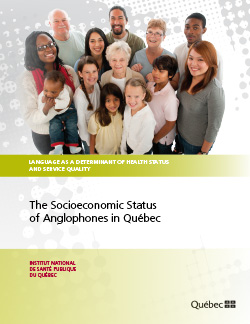The Socioeconomic Status of Anglophones in Québec
As part of a wide-ranging project to study the health status of Québec's Anglophones, the present analysis examines the Anglophone population's socioeconomic situation over time, by geographic area, and in comparison with Francophones. The variable used to establish membership in the Anglophone population is the mother tongue. The study analyzes standard socioeconomic indicators, as well as income disparity.
The analysis of census socioeconomic indicators shows that despite a generally positive progression over the period 1991-2006, the relatively favourable picture of the socioeconomic situation of Anglophones for Québec as a whole is tempered when the available data are examined by geographic area and in comparison with Francophones. For example, despite high levels of university education, Anglophones register higher unemployment rates than Francophones. And despite higher average incomes overall, they are proportionally more likely to live below the low income cut-off. Geographical analysis also brings out regional disparities and reveals greater income gaps among anglophones in the Montréal census metropolitan area (CMA). The following table summarizes the main findings by area.
Income disparities were analyzed using the Gini coefficient, which confirmed that income inequality is more pronounced among anglophones than among francophones, and more so within the Montréal CMA. In particular, Anglophone men in the Montréal CMA stood out with an especially high indicator of income disparity throughout the period under study.
Main findings on anglophone socioeconomic status by region
|
Region |
Compared to francophones |
Compared to other regions |
|
Montréal CMA |
Greater disparity: both richer and poorer |
Where there is the greatest level of socioeconomic inequality |
|
Other CMAs |
Comparable or slightly advantaged |
Fewest disparities and generally a favourable socioeconomic status |
|
Non-CMA |
Largely comparable |
All socioeconomic indicators are less favourable except for low income cut-offs levels |
The analysis brings to light not only that Anglophones have lost a relative socioeconomic advantage in comparison with Francophones, but also the widening gaps within the anglophone population. Socioeconomic status being a determinant of health status, it remains to be seen what effect the current situation may have on Québec anglophones' future health status.


